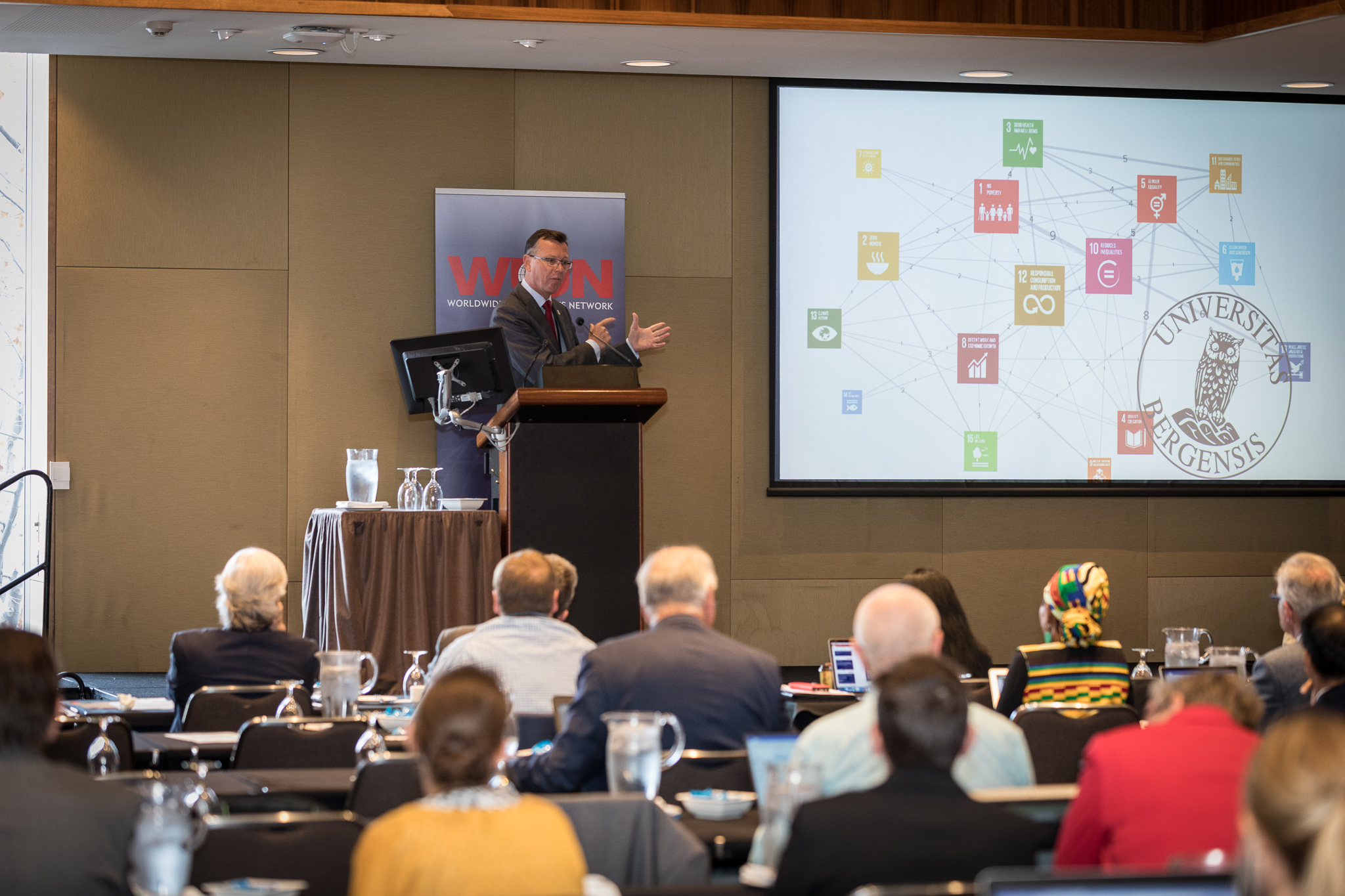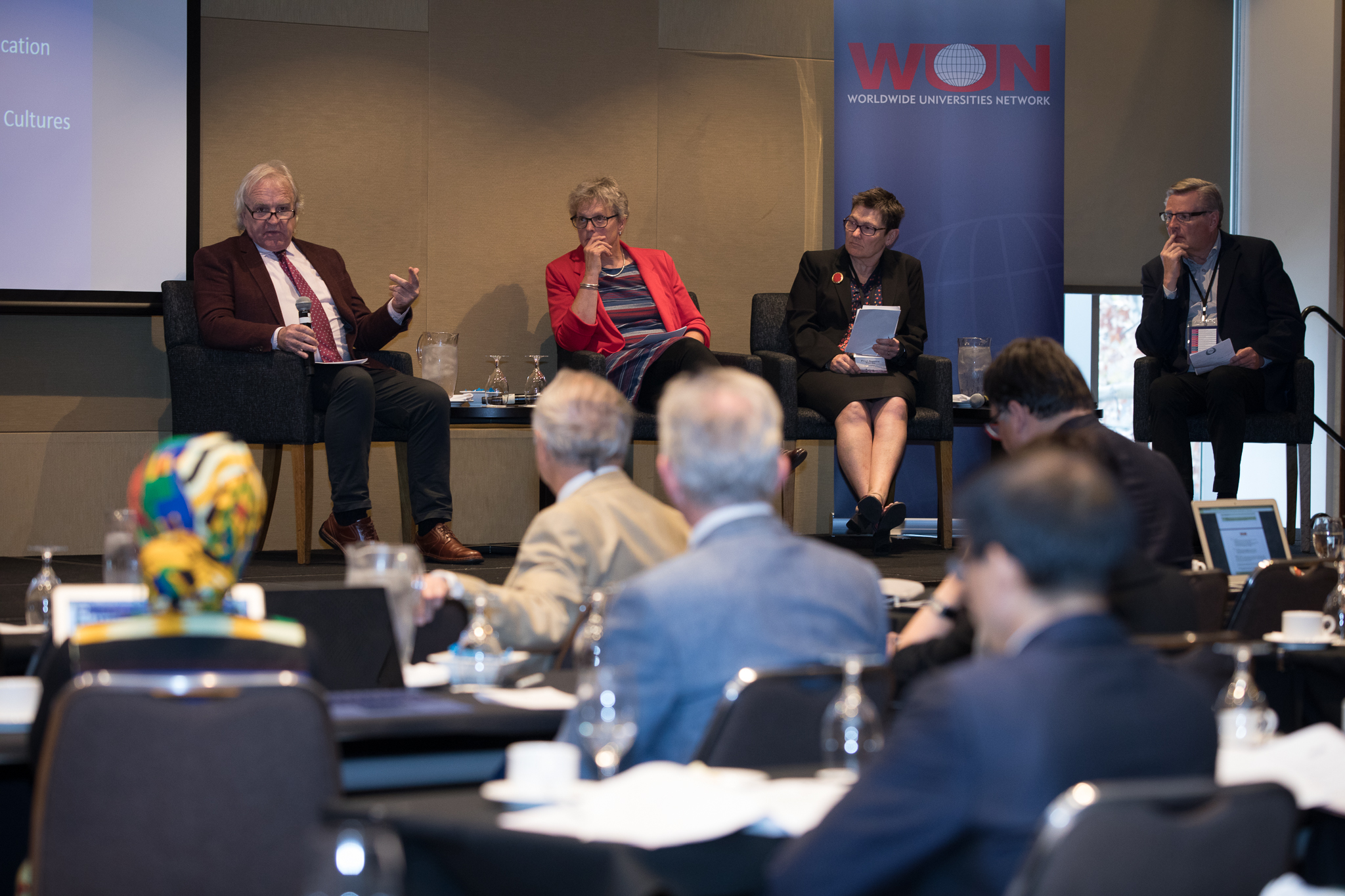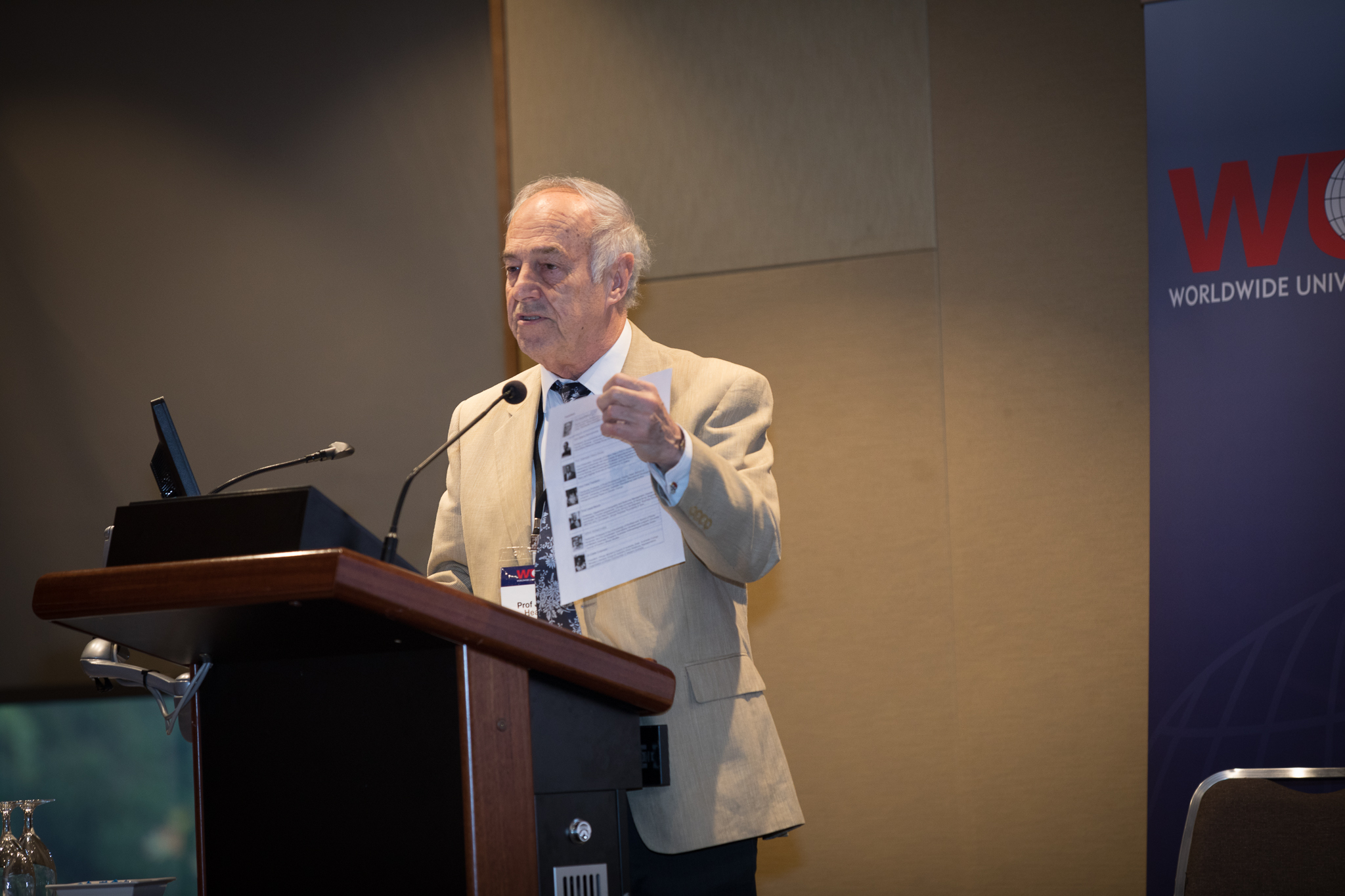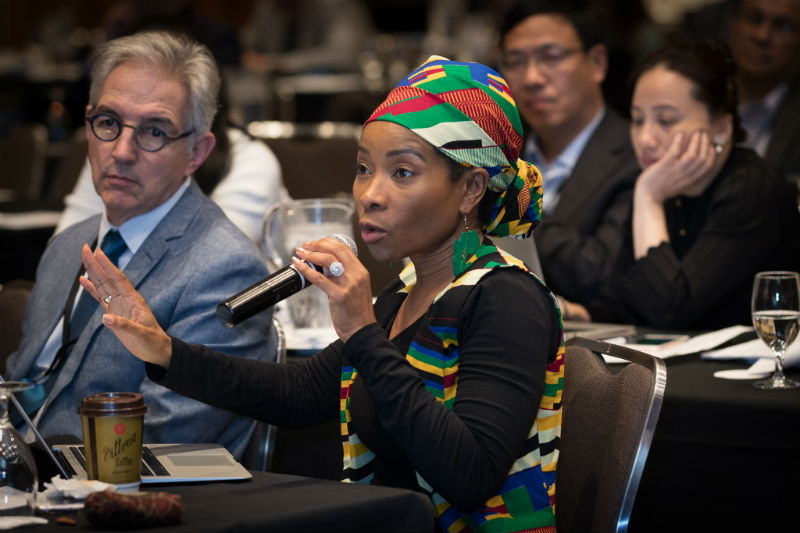
On May 25, the Worldwide Universities Network (WUN) gathered university vice-chancellors, presidents and other specialists from Africa, Asia, Europe, North and South America, and Oceania at its eighth Presidents Forum in Perth to help shape its new body for interdisciplinary knowledge leadership that prioritizes global policy impact. WUN launched its Global Policy Research Group (GPRG) in March in Renmin, China, to guide its engagement with major global policy frameworks, including the SDGs, Paris Climate Accords, Belt and Road Initiative and regional policies developing for Europe with BREXIT, Africa and the Indo Pacific.
‘The Presidents Forum is the second phase of the launch,’ explained WUN’s Executive Director, Professor John Hearn. ‘Forum discussions will assist WUN’s China Group, Africa Group, disciplinary and enabling support groups to determine the GPRG’s governance structure and take the next steps to intensify our global impact.’
Professor Dawn Freshwater, Vice-Chancellor, University of Western Australia, and Member of WUN’s Partnership Board, set the context for the consultation – noting the ‘demise of the expert’, the contested space of ‘evidence’, and the waxing and waning of public trust in institutions (including universities) and in the information they share.
Although universities now had duelling missions as social enterprises and sustainable businesses, she said, it was still important for them to come to grips with how they could generate and implement policy that improved lives.
The challenge for WUN members was to discover the synergies that lay between them locally, regionally and internationally, she said, so they could have the greatest impact – not only as individual universities but as a collective, with knowledge and insights that spanned continents.
‘Simply broadcasting messages to the globe around our value is not going to work.’
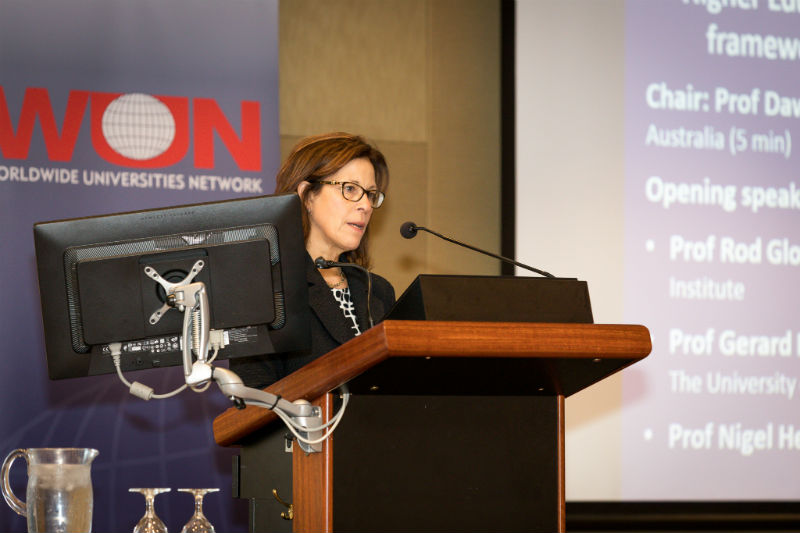
Professor Dawn Freshwater, Vice-Chancellor, University of Western Australia
‘Through the creation of the UWA Public Policy Institute (launched by UWA on May 22) we aim to take our engagement with communities, both at home and internationally, to a new level as we strive to be more visible and have greater impact.’
Chair of the institute’s advisory board, international law professor Stephen Smith, said that in a world where many people had their views reinforced by like-minded voices through social media it was imperative for universities to get their research and advice ‘out there’; to influence leaders to make better decisions based on ‘fact, evidence and long-term, sensible analysis’.
Professor Smith, a former Australian foreign affairs and defence minister, also urged WUN’s members to carefully consider the shifting geopolitical context in which they conducted their research and assessed its impact.
‘In the blink of an eye in a scholarly, historical and research sense – by anywhere between 2040 and 2050 – there’ll be three great economic powers with China, the US and India.’
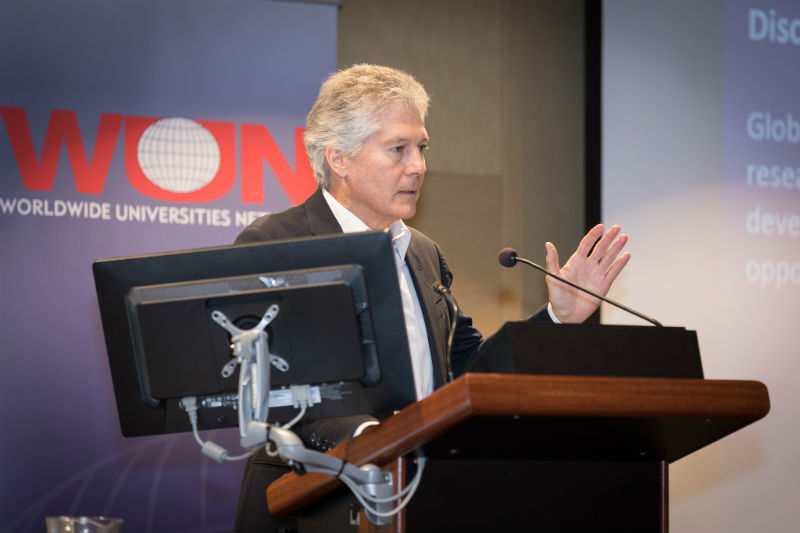
Professor Stephen Smith, former Australian foreign affairs and defence minister
A strong line-up of speakers explored four key areas during the forum: global policy frameworks, synergies and opportunities; regional action plans for engagement; local priorities for global challenges; and strategies to ensure WUN maximizes its opportunities for policy-centred involvement.
Key speakers included Professor Rod Glover (Monash University), Professor Gerard Postiglione (The University of Hong Kong), Professor Nigel Healey, (Fiji National University), and Professor Dag Rune Olsen, Rector, (University of Bergen).
Professor Glover from Monash University’s Sustainable Development Institute gave a succinct overview of the work of the UN Sustainable Development Solutions Network (UN-SDSN. This included outlining UN-SDSNs efforts to build university leadership on the SDGs and to advocate for the higher education sector to be recognised as a critical partner in SDG implementation. Professor Hearn agreed with Professor Glover about the potential benefits of forging a closer association between WUN and UN-SDSN and said he had already set up a meeting to explore how the two networks could strengthen connections.
Professor Gerard Postiglione, Chair Professor of Higher Education at the University of Hong Kong, said China had embraced a deeper level of engagement in globalization with its Belt and Road Initiative. The success of China’s universities would depend on how domestic demands were balanced with aspirations to go global, which encompassed a deepening of internationalization, a protection of Chinese educational sovereignty, and a higher degree of institutional autonomy to drive innovation.
Professor Rocky Tuan, Vice-Chancellor and President of CUHK, said he believed the BRI presented ample opportunities for policy research and collaborative efforts between universities as well as with national and international agencies. It was of strategic importance, he said, to examine China’s global development in areas such as trade, economics, finance, logistics and technological infrastructure, and to investigate how other parts of the world might perceive and receive the initiative, including how it would influence their policies.
Professor Dag Rune Olsen, Rector of the University of Bergen (UiB), explained how UiB’s first SDG Conference Bergen held in February had provided an excellent meeting place for scientists, politicians and other stakeholders to discuss how science could inform policy making.
UiB’s work towards Agenda 2030 also reflected its deep commitment to research that could find solutions to significant societal challenges and to locating the drivers of sustainable development (and which may not have been highlighted in the sustainable development goals or sub goals).
Professor Olsen said he was sure the SDGs needed ‘policy development informed by science’ and that universities could play a substantial role in providing this information without losing sight of their primary purpose to educate students.
‘It’s not that we’re going to meet the goals on behalf of this world. It’s not that we’re going to develop the policies. Our role is to inform. And I do think that it is only universities that could possibly aim to do this regarding highly complex questions like the SDGs.’
Professor Joseph Sung, Mok Hing Yiu Professor of Medicine at the Chinese University of Hong Kong (CUHK) said that while most of the Chinese government’s strategies and public policies have global influences it was still important for WUN members not to consider the Belt and Road Initiative (BRI) as a ‘solely Chinese’ policy initiative.
BRI was an alliance, he said, a concerted effort in the region to try to improve the economy, to improve living standards, and to narrow the gap of poverty.
‘If some countries are putting big resources into this, how are we going to tap the resources?’ he asked. ‘And soft power – what does it mean to be a soft power? I think nurturing talent is one way to exercise soft power, as is training people to be more successful businessmen, more successful scientists. I think we need to nurture our future generation scientists to have all the values and ethics in mind.’
African perspectives
Dr David Mickler, Senior Lecturer, University of Western Australia (UWA) and Co-Chair WUN Global Africa Group (GAG), said African perspectives were often excluded from global policy discussions. This was why GAG had chosen to operate at the intersection of the global and regional research and development agendas ensuring critical questions were asked about the relevance of different development and resource frameworks for the African continent.
‘GAG is working to deepen its integration within the wider WUN system and regional and global research development and policy frameworks,’ he said. ‘We hope that GAG provides a useful model for pursuing equitable, productive, and sustainable research collaborations that meet the priority needs of African societies.’
Universities have a role as knowledge translators
Professor Robyn Owens, Deputy Vice-Chancellor (Research) of the University of Western Australia (UWA), said she thought that the role of the academic was changing to be that of a ‘knowledge translator’ as much as a ‘knowledge creator’. This was evidenced by the number of governments around the country that had been deliberately asking universities to translate the benefits of their research to industry and to the public, she said.
Professor Robyn Owens, Deputy Vice-Chancellor (Research) of the University of Western Australia (UWA)
Dr Max Price, Vice-Chancellor of the University of Cape Town, felt it was important to hear multiple voices relating to global development. The forum had listened to advocates for the Belt and Road Initiative but participants had also heard a little (though still less) about Confucius Institutes on university campuses being shut down. ‘I would like to hear the other voice,’ he said.
Professor Peter Davies, Pro Vice-Chancellor (Research) for UWA and Vice Chair of WUN’s Responding to Climate Change (RCC) group said the RCC now had over 22 active projects from which more than 50 publications had been produced thanks to significant grant success. With accreditation at the COP22 meeting in Marrakesh, he said, the IPCC had appointed UWA’s Petra Tschakert as Coordinating Lead Author on the next IPCC Report. Ms Tschakert is author of Chapter 5 on “Sustainable Development, Poverty Eradication and Reducing Inequality’ and a summary for Policy Makers.
Given that RCC had been able to attract significant external funding for international research, Professor Davies invited researchers involved in WUN’s other Global Challenges with research strengths in climate change to link up with the RCC and make a case to access a portion of the funds.
Caroline Dyer, Professor of Education, University of Leeds and Chair of WUN’s Global Higher Education and Research said GHEAR’s commitment was to ‘high quality 21st Century universities that could make a global commitment to sustainable development’. GHEAR’s work in the coming year would therefore focus on: The research role of global higher education institutions (HEIs) in discerning how HEIs are shaping and are shaped by society and are shaping and shaped by students; the legitimacy and authority of the university in a changing world; and the impact of various mobilities on higher education.
Professor Dyer also said she found ‘the very simple, rather linear, causality of some of the ways we are trying to claim impact’ deeply problematic. Measuring impact this way didn’t necessarily work in the social sciences, she said, because these disciplines often involved a ‘slow diffusion of ideas’.
Dr Tore Saetersdal, Deputy Director of the Section for Global Challenges at UiB and Chair of WUN Understanding Cultures, said it was important to construct research teams that included communications specialists and policy makers ‘from the very first meeting’.
Dr Saetersdal, who has been in charge of large multi-partner, multi-disciplinary, projects with African and Asian partners involving disciplines from engineering to humanities and social sciences, said he was concerned about some approaches mentioned in the forum that inferred that you could ‘just add culture and stir’.
‘In WUN, we are well equipped to sit together across multidisciplinary teams that can make good contact with policy organisations and also come up with relevant policy, relevant informed results, and simultaneously do good disciplinary research.
‘Old universities that are big institutions are often difficult to turn,’ he said. ‘However, if we can find ways of putting together international teams, they are often more flexible than our own national university team – and that’s the strength of WUN as I see it.’
Ann Singleton, Senior Research Fellow at the University of Bristol, Senior Advisor to IOM GMDAC, and Co-Chair of WUN’s Understanding Cultures, said migration presented a major global policy challenge for governments and academics.
WUN had the potential to be a catalyst in developing a global network of migration scholars with perspectives from the Global South, to bring insights to the research and policy agendas, too often dominated by Eurocentric policy concerns and priorities. The UN’s 2030 Sustainable Development Agenda, the SDGs and the Global Compact on Migration (GCM), provided an historical opportunity for the academic and policy worlds to collaborate and contribute to the GCM discussions through WUN’s Knowledge Partnerships and with the inter-agency Global Migration Group.
She also encouraged network members to attend and promote the Migration for Data Summer School in July in Bristol, which would combine a mixture of hands-on training for people to learn the skills of collecting, managing and organising migration data along with how to analyse and understand which data meets policy needs.
Dr Lee Nedkoff, an early career researcher and Research Fellow at UWA, said that if WUN was serious about bringing early career researchers (ECRs) into the network it needed to actively target them early while they were trying to develop their research portfolios and to advance their research careers.
She said ECRs could contribute to the evidence base required for strategic policy development just as WUN could offer ECRs ‘a bed of evidence’ they could utilise to develop their own research portfolio and questions that could have a meaningful impact in the future.
Dr Lee Nedkoff, early career researcher and Research Fellow at UWA (right)
Professor Liu Yuanchun, Vice President of Renmin University of China (RUC) and Co-Chair of WUN’s Global Policy Research Group said that under the Belt and Road Initiative, RUC was striving to collaborate with countries in various areas, and especially relating to higher education research and development, talent cultivation and academic research.
Professor Peter Quinn, Executive Director of the International Centre for Radio Astronomy Research of UWA demonstrated how the Square Kilometre Array (SKA) radio telescope would revolutionize people’s view of the universe – exploding their ability to explore, map and make discoveries within the universe by ‘more than a factor of 3000’.
Since its launch in 2009, the International Centre for Radio Astronomy Research (ICRAR) had played an integral role in the development of the SKA project, he said, and had grown into an internationally renowned, multi-disciplinary research centre for science, engineering and data intensive astronomy.
A central focus of ICRAR’s first five years of operation had been to secure the SKA site for Australia and contribute to the international collaboration in funding, designing and constructing the SKA. Attracting top academics from around the world and developing more than 30 early career staff into world-class researchers had helped ICRAR secure $68M AUD in grants – including two Australian Research Council Centres of Excellence grants, 40 industrial partnerships and 40 collaboration agreements. ICRAR had also drawn $400M AUD in Federal funds to Western Australia on the strength of its technological innovations and capacity to boost jobs.
One pivotal reason the project had been so successful, said Professor Quinn, was that ‘you had to collaborate to see the whole sky’.
Enduring diplomacy
In his summary of the forum’s proceedings, Professor John Hearn said he had been moved by Professor Nigel Healey’s graphic account of the challenges in the Pacific, which had highlighted a number of practical ways WUN could work in collaboration with its colleagues in the region.
‘In addition to our education research being enduring diplomacy we can be part of soft power,’ Professor Hearn said, ‘and much more practical in terms of partnerships and knowledge.’
He said the Presidents Forum discussion had given WUN members a ‘reality-check’ on ethics, trust, integrity and values and that this, plus tensions between traditional and new media, needed to be factored into discussions about how to take the GPRG forward.
Professor Hearn also said it was important not to presume that universities were at the peak of trust in society. ‘What are we doing about controlling costs of degrees? What are we doing with our governments about controlling the debts that our graduate students or our medical students or undergraduate students are running up – debts that inhibit lives and careers of people in their 20s and early 30s?’
Injecting policy imperatives and expertise into WUN’s existing global challenge themes, building WUN’s public profile through using policy recommendations from WUN’s research, and providing the knowledge base for policy recommendations were all important as WUN and the GPRG moved forward, he said.
‘We’re already five years into the Belt and Road, and with the SDGs there’s just 12 years to go’ said Professor Hearn, ‘and sometimes the progress feels glacial. If we’ve got the talent, the knowledge, and the vehicles through the policy institutes – which we have – we just cannot miss the boat.’
